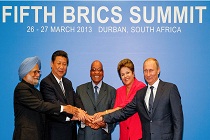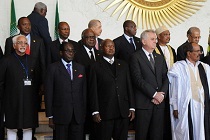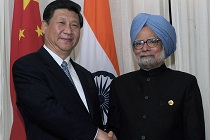A clarion call to study BRICS
The launch of the BRICS Universities League in Shanghai is an important effort for the five nations to understand each other and define their place in global governance
 Courtesy: Blog do Planalto
Courtesy: Blog do Planalto
The launch of the BRICS Universities League in Shanghai is an important effort for the five nations to understand each other and define their place in global governance
 Courtesy: Ministry of External Affairs, India
Courtesy: Ministry of External Affairs, India
The role of the emerging economies of Africa was discussed at the recent summit of the African Union. Africa’s resources are crucial to fuel such economic powerhouses as India, Brazil and China, and India must accelerate its trade and aid relationship with the continent.

In 1990, the erstwhile South Commission recommended the creation of a 'South Bank' to aid the economic emancipation of the global South. Can the BRICS bank, which was discussed in length at the 5th BRICS Summit, provide a solution to the problems of the crisis-ridden African continent? Devaki Jain blogs
 Courtesy: Ministry Of External Affairs, India
Courtesy: Ministry Of External Affairs, India
Indian foreign policy has not yet addressed the ramifications of Chinese economic dominance in BRICS. Nor have we matched China’s engagement within the group to ensure that the BRICS vision of a new international order for emerging economies actually works in their favour.
The establishment of a BRICS Development Bank will be among the prime topics of discussion at the BRICS Summit on March 26. Gateway House’s Akshay Mathur interviews former Indian Ambassador and Foreign Secretary, Shyam Saran, on the prospects and viability of alternate financial architectures.
 Courtesy:
Courtesy:
India’s relations with Islamic nations, many of which are members of the Organisation of Islamic Cooperation (OIC), have become even more prolific over the last decade. While India does not visualise becoming a member of a religious international body, many reasons militate against our formally joining the OIC.
 Courtesy: Shwkyn231/Flickr
Courtesy: Shwkyn231/Flickr
The year 2012 has been a busy one for foreign policy: from escalating disputes in the South China Sea to alternate financial instruments from the emerging world. India’s foreign policy too has its shown strengths and weaknesses. We present our top foreign policy Hotspots, Sweet spots and Blind spots for 2012.
 Courtesy: Foreign Affairs
Courtesy: Foreign Affairs
There’s been much talk about the “the rise of the rest,” with Brazil, Russia, India, and China leading the charge. However, few countries can sustain unusually fast growth for a decade, and even fewer, for more than that. As the boom years begin to end, the international order won’t change as much as expected.
 Courtesy: trendscout::/Flickr
Courtesy: trendscout::/Flickr
All the major economic forces in the world have come together in Africa in a new version of the Great Game. The competition for the continent’s resources will ultimately harm Africa unless Africa uses this opportunity to its advantage and to address its own serious problems.
Though some countries like Russia gained a strong foothold in Central Asia and the Caucasus post-1991, India has been a late-comer. Gateway House interviews former Ambassador to Azerbaijan Debnath Shaw to discuss India’s energy interests in the region, the Shanghai Cooperation Organization and the TAPI pipeline.